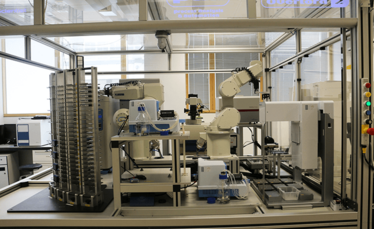Rise of the Machines
A ‘robot scientist’, capable of independently carrying out drug screening research, has been developed by UK researchers.
First there was Adam, the first robot to autonomously make a scientific discovery. Adam hypothesised and experimentally confirmed the functions of genes in yeast, and now Adam’s successor, Eve, is turning her attention to drug development (1). Eve can automate library-screening, hit-confirmation, and lead generation through cycles of quantitative structure-activity relationship learning and testing. The system’s creators, from Cambridge University and the University of Manchester, hope that Eve will help speed up the development of drugs for neglected tropical diseases.

“It’s shameful to live in a world where people suffer and die from neglected tropical diseases when with modest resources they could be mostly eliminated,” says Ross King, a professor at the Manchester Institute of Biotechnology. “Standard ‘brute-force’ automated screening is simple, but slow and wasteful of resources as every compound in the library is tested. It is also unintelligent, as it makes no use of what is learnt during screening. Eve uses active learning to find most of the hit compounds by only screening a fraction of the compounds. We demonstrate that for most price models the intelligent approach outperforms the brute-force approach.”
Robots are already involved in almost all drug discovery, as are machine learning systems in forming quantitative structure–activity relationship models (QSARs). Eve integrates these technologies and also uses active learning and yeast synthetic biology-derived assay systems, which allows the system to select examples to test its hypotheses.
“I argue that a radical decrease in the cost and increase in the speed of drug discovery could be achieved by the full automation and standardization of procedures. By this I mean, a robotic system that once given a target could autonomously develop a standardized assay for that target, screen a compound library using that assay, confirm hit compounds and identify lead compounds through cycles of QSAR learning and testing,” says King.
He adds that Eve’s synthetic biology assays could be automated using existing technology and notes that chemical synthesis machines that could be integrated with the robot already exist. He and his colleagues are currently collaborating with groups in Manchester and Chicago to enable Eve to use text-mining to read scientific literature.
- K. Williams et al., “Cheaper Faster Drug Development Validated by the Repositioning of Drugs against Neglected Tropical Diseases”, J. R. Soc. Interface 12, 20141289 (2015).

Making great scientific magazines isn’t just about delivering knowledge and high quality content; it’s also about packaging these in the right words to ensure that someone is truly inspired by a topic. My passion is ensuring that our authors’ expertise is presented as a seamless and enjoyable reading experience, whether in print, in digital or on social media. I’ve spent fourteen years writing and editing features for scientific and manufacturing publications, and in making this content engaging and accessible without sacrificing its scientific integrity. There is nothing better than a magazine with great content that feels great to read.



















